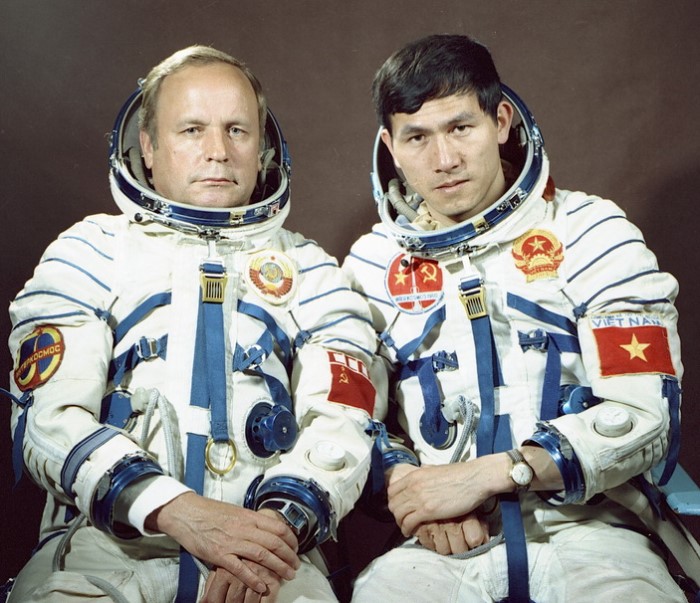On a warm July evening in 1980, the roar of rocket engines thundered across the vast Kazakh steppe, shaking the ground beneath the Baikonur Cosmodrome. As the Soyuz 37 spacecraft pierced the twilight sky, it carried not just two cosmonauts—but also the hopes and pride of a newly unified Vietnam. Phạm Tuân, once a fighter pilot in a war-torn nation, now soared toward the stars as the first Southeast Asian—and the first non-Soviet Asian—to ever leave Earth. It was a moment that echoed far beyond the launchpad, symbolizing Vietnam’s postwar emergence and Southeast Asia’s entry into the space age.
His journey—from the lush rice fields of Bắc Giang Province, where he was born during colonial rule, to the weightlessness of Earth’s orbit—is nothing short of extraordinary.
Humble Beginnings in Northern Vietnam
Phạm Tuân was born on February 14, 1947, in the rural commune of Quốc Tuấn, in Nam Sách District, Hải Dương Province—a region located in northern Vietnam not far from Hanoi. Growing up during the final years of French colonial rule and into the early days of the First Indochina War, Tuân experienced firsthand the hardship and resilience that would later shape modern Vietnam.

He showed early aptitude in mathematics and engineering, which led him to pursue technical education before entering military training. As the Vietnam War escalated, Tuân joined the Vietnam People’s Air Force in 1965, where he studied aviation and aeronautics and trained to become both a pilot and an engineer.
A War Hero in the Skies
Tuân’s military career took flight during the Vietnam War. Flying Soviet-made MiG fighter jets, he participated in high-stakes aerial battles against American aircraft. In December 1972, during the dramatic U.S. bombing campaign over Hanoi known as Operation Linebacker II, Tuân was credited by the Vietnamese government with the daring feat of shooting down a U.S. B-52 bomber. While this claim remains unverified by U.S. sources, it quickly turned him into a symbol of national heroism.
From Warfighter to Space Explorer
As Vietnam transitioned from war to peace, it sought deeper cooperation with the Soviet Union. In 1979, Phạm Tuân was selected to represent Vietnam in the Intercosmos program, which offered non-Soviet allies the chance to fly in space.

On July 23, 1980, Tuân launched from the Baikonur Cosmodrome with Soviet cosmonaut Viktor Gorbatko aboard Soyuz 37. Their mission lasted nearly eight days, six of which were spent aboard the Salyut 6 space station conducting scientific experiments in microgravity.
This mission made Tuân the first Vietnamese, the first Southeast Asian, and one of the first non-Soviet Asians to travel into space.
Honored at Home and Abroad
Upon returning to Earth on July 31, 1980, Tuân received one of the Soviet Union’s highest honors: the title of Hero of the Soviet Union. In Vietnam, his mission was celebrated as a major diplomatic and scientific milestone.

He resumed his military career, rising to the rank of lieutenant general in the air force. Beyond the military, Tuân was appointed as a member of the National Assembly, and he served as chairman of the General Department for Defense Industry, where he helped develop and modernize Vietnam's defense technology.
Life After Space
Despite his fame, Phạm Tuân remained a private and modest man. He lived most of his later life in Hanoi, where he continued working in government roles and mentoring younger military officers. In interviews, he often downplayed his accomplishments, emphasizing instead the collective achievements of Vietnam and its partnership with the Soviet Union.
He married and raised a family, and while details about his personal life were kept mostly out of the public spotlight, those close to him describe him as warm, humble, and deeply committed to his country.
In 2008, Tuân retired from active military and governmental duties. He spent his final years enjoying a quieter life, occasionally appearing at national events and space science conferences as a revered figure in Vietnam’s modern history.
A Lasting Legacy
Phạm Tuân passed away in 2024, leaving behind a powerful legacy—not just as a soldier and cosmonaut, but as a symbol of Vietnamese resilience and ambition. His life’s journey—from a small village in northern Vietnam to the edge of outer space—remains one of Southeast Asia’s most inspiring stories.



















